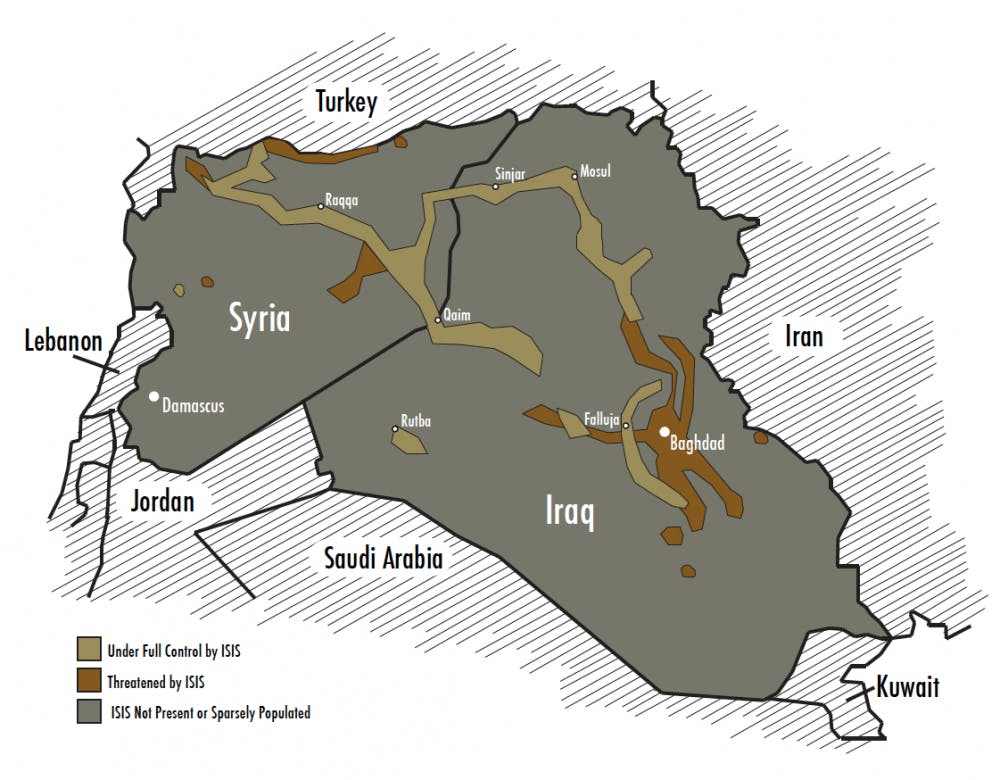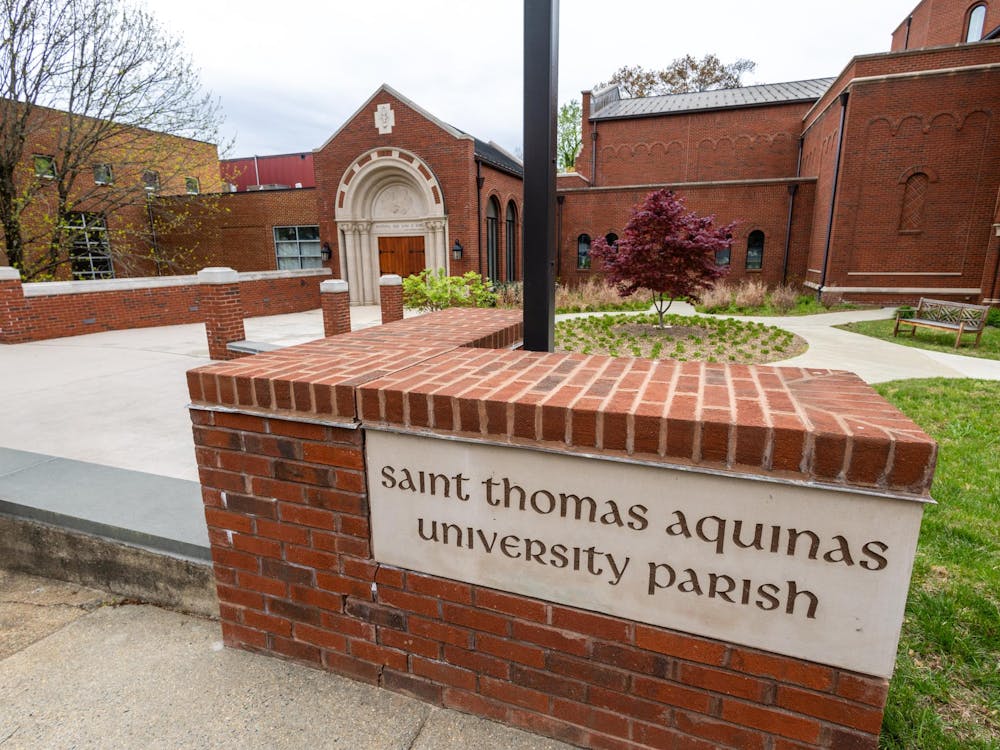A collaborative effort between the University, charity organizations and research groups brought a swath of engaged professors, politicians and aid workers to Grounds last month for a panel to discuss the Islamic State, the violence the organization perpetrates against women and various strategies the international community can employ to alleviate the challenges victims face.
The conference — hosted jointly by the AMAR International Charitable Organization, the University’s Morven Project, Presidential Precinct and the Women’s Center on Oct. 27 — came to the University because of recent ties to the AMAR organization, spearheaded by Law Prof. Deena Hurwitz.
Morven Project Director Stewart Gamage said the University is the ideal location to launch this type of collaborative dialogue. Those who came were tasked with a single question.
“What can a university in America do to be useful?” Gamage said at the conference. “That’s kind of the first thought we had — how can the University of Virginia contribute to the dialogue?”
What is ISIS?
The Islamic State of Iraq and Syria, commonly referred to as ISIS or ISIL, is an extremist Islamic denomination which operates under the goal of uniting Sunni areas of Iraq and Syria under Sharia law. Beginning as an arm of al-Qaeda in 2006, ISIS added a Syrian rebel force, the al-Nusra Front, in April 2013. This force stemmed largely from discontent with the Assad regime in Syria.
“ISIS came out of the policies dealing with the Syrian revolution, refusing to really to help them establish the democracy they were looking for,” Hurwitz said at the panel.
ISIS began to seize towns in Iraq and Syria after al-Qaeda abandoned ties with the group in February. ISIS enforced Sharia law in seized towns, meaning its edicts covered both the religious and the secular. Initially, the group amassed funding through extortion and robbery.
“Essentially, ISIL is working on the bigger picture of total domination,” said Baroness Emma Nicholson of Winterbourne, the president of AMAR, during the panel.
To achieve this, ISIS has carried out multiple public executions, dispossessions and crucifixions of American and British journalists and aid workers. ISIS has also expanded its control and means of sourcing income by seizing a Syrian oil field last July and participating in human trafficking networks.
“ISIL is, at the moment, preoccupied in gaining funds,” Nicholson said. “So its interests are in grabbing oil installations, kidnapping and selling people, hostage-taking and slave-trading.”
Nicholson said ISIS is solidifying its control over conquered areas by directly attacking families at the root of society.
“Family is the basic unit of society, therefore the unit of society that dictatorships attack,” Nicholson said. “If ISIL continues, we’ll see millions of people in the region flee.”
To do this, ISIS has specifically targeted women and girls.
“If you can attack the family and break them apart — especially women and girls who horrific things are done to, and then are seen as defiled by their family and shunned as a possibility — then you’ve really ripped apart the essence of what it takes to make up a community,” Gamage said.
Haleh Esfandiari, director of the Middle East program at the Woodrow Wilson International Center for Scholars, said that though Western intervention in the Middle East is controversial, it may be necessary. The Iraqi and Syrian forces cannot sufficiently act without assistance, he said.
“No civil society organization in Iraq or Syria can do this on its own,” Esfandiari said.
The University's role
For a conflict boiling over thousands of miles away, currently being addressed at the highest levels of government, the role of the University community is not immediately obvious — but Hurwitz said the panel underscored the important place discussion holds in international conflict.
“When I started asking questions about the objectives we were trying to reach, I thought this was really good,” Hurwitz said. “The fact that they have this focus on responses and thinking about advocacy and action. It’s a really great way to do a conference, especially at a university where there’s so much discussion and there’s so much practice.”
University students also offered insight, which Gamage said worked to create robust discussion.
“I was really thrilled with having students participate,” Gamage said. “I think the issues and the suggestions were really concrete and very specific, and some were actually new.”
Students and other conference attendees first discussed where humanitarian groups and governments should direct their attention.
“People don’t really know what to do,” Nicholson said. “I see this as a hearts and minds issue, that we have to target the center of it — the motivation.”
The panel discussed immediate action that non-governmental organizations and governments could take. Esfandiari said these methods include establishing homes and shelters for displaced women and providing health and mental care for those affected.
“As ISIS is defeated and pushed out of towns and cities, we need to work with local societies and organizations,” Esfandiari said.
The conference also addressed the lasting consequences of ISIS’s actions. Esfandiari said long-term solutions include establishing rehabilitation centers, providing legal support and changing the public perspective on abused women through the use of local media.
“We need to work with local civil society organizations [to] find ways to help re-integration … [and] provide these women with homes, counseling and jobs,” Esfandiari said.
At the conference, Nicholson noted she was set to address the British Parliament on ISIS and the efforts the British government could take.
“She wants to bring up the points that we made,” Gamage said. “That’s kind of exactly what we were hoping.”
In her address to Parliament Oct. 30, Nicholson updated the House of Lords on AMAR’s progress and encouraged further British assistance.
“I believe that this is something that Britain, with our slender hard power but very strong soft power, can rightly pursue at this point,” Nicholson said in her address.
A push for student activism
Sharon Davie, director of the University Women’s Center, emphasized the importance of student engagement, as the consequences of ISIS are ongoing. The younger generation eventually must confront and solve the long-term problems, she said.
“Another thing with the conference that we were hoping is that the next steps will be taken by students, by younger people,” Davie said. “It was really important to have students be part of this — that was I think, from the get-go, really key.”
Another long-term goal of the conference was to change public perspectives of Islam. Hurwitz emphasized that ISIS is an extremist denomination of Islam and its beliefs are not in line with mainstream Muslim ideals.
“It’s very important to many Muslims, including clerics and imams and scholars of Islamic law, that there be an understanding that Islamic law is meant to be interpreted for the times,” Hurwitz said.
With a deeper understanding comes an increased call to action, Nicholson said.
“I would just love students from this University helping,” she said. “Blog, Facebook, anything.”
Davie said students can also contribute through gathering clothes — but she to underscored the value and ease of social media as a tool to raise awareness.
“Having a clothes drive would really help, [or] helping an NGO,” Davie said. “Really, it’s people who are interested being able to use social media to give a version of what is happening there that is quite different from what we’re hearing.”
Hurwitz said students should travel and learn to truly understand how these global problems arise.
“Get out of your comfort zone, go places where you’ll encounter people who don’t think like you, people whose lives are different and people whose social class is completely different from yours,” Hurwitz said. “Go see what it’s like in a country that has a lot of poverty, go see how people thrive in their own ways, ... and go understand what’s the conflict.”







